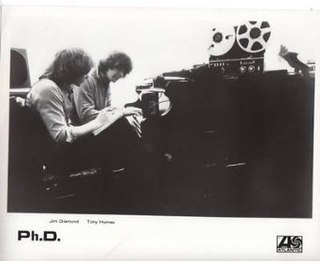
James Aaron Diamond was a Scottish singer-songwriter, best known for his three top 5 hits: "I Won't Let You Down" (1982), as the lead singer of PhD; and his solo performances "I Should Have Known Better", a United Kingdom No. 1 in 1984, and "Hi Ho Silver", the theme song from Boon, which reached No. 5 on the UK Singles Chart in 1986.

Simon Phillips is an English jazz fusion and rock drummer, songwriter, and record producer, based in the United States. He worked with rock bands during the 1970s and 1980s, and was the drummer for the band Toto from 1992 to 2014.

Nightlife is the fourth studio album by Irish rock band Thin Lizzy, released on 8 November 1974 by Vertigo Records. It was produced by Ron Nevison and bandleader Phil Lynott, and was the first album to feature the band as a quartet with newcomers Scott Gorham and Brian Robertson on guitars.

Eyes of a Woman is the second English-language solo studio album by Swedish singer and former ABBA member Agnetha Fältskog, and her eighth studio album overall. It was released in March 1985.

Primitive Cool is the second solo album by English singer Mick Jagger, released in 1987. As the follow-up to Jagger's 1985 album She's the Boss, Primitive Cool was another attempt by Jagger to make him a solo star.

Diamond Dave is the sixth studio album by David Lee Roth, former lead vocalist of Van Halen. It was released in 2003 on Magna Carta Records.

You is the twenty-second studio album by American singer Aretha Franklin, released on October 16, 1975, by Atlantic Records.

Ph.D. were a British duo best known for their UK top 10 hit "I Won't Let You Down" in April 1982, which had been a hit the previous year throughout Europe.

Steve Winwood is the debut solo studio album by blue-eyed soulster Steve Winwood. It was released in 1977, three years after the break-up of his former band, Traffic. Though the album sold moderately well in the US, it was a commercial disappointment compared to Traffic's recent albums, peaking at number 22 on the Billboard 200 album chart. In the UK, however, while Traffic's recent albums had only been moderately successful, Steve Winwood reached number 12 on The Official Charts. Island Records launched two singles from the album, "Hold On" and "Time Is Running Out", both of which failed to make the charts.

Free Spirit is the eleventh studio album by Welsh singer Bonnie Tyler, released in Europe on 3 October 1995, by EastWest Records and in the United States on 26 March 1996 by Atlantic Records. Tyler recorded the album with numerous producers, and it was her first album release in the UK and the US since Hide Your Heart (1988).

"I Won't Let You Down" is a song by British band Ph.D., released as the second single from their eponymous debut studio album (1981). It entered the Australian charts in October 1981 and reached number five; it entered the UK Singles Chart in April 1982 at number 34, peaked at number three the following month. It went on to become the 23rd best-selling single of 1982 in the UK.

Is It Safe? is the second album from Ph.D., released in 1983. It was their last album until their 2009 comeback Three. Is It Safe? was reissued by Voiceprint Records in 2010. Drummer Simon Philips had quit the band, which now consisted solely of Jim Diamond and Tony Hymas. The album's opening track, "I Didn't Know", failed to chart in Britain but was a hit across Europe.

Three is the 2009 comeback album and final release from Ph.D. It was their first album since 1983's Is It Safe?.

Theodore and Friends is the debut album from the Northern Irish rock band the Adventures, released in 1985.
Anthony James Keith "Tony" Hymas is an English keyboard player, pianist, and composer. In the Eighties he formed the band Ph.D., who had a Top 10 hit in the UK with the song "I Won't Let You Down" in 1982. He worked closely with Jeff Beck, recording with him the 1980 album There & Back, and the 1989 album "Jeff Beck's Guitar Shop".

"Little Suzi's on the Up" is a song by British new wave group Ph.D. It was released as the band's first single, appearing on their self-titled debut album. The music video for the song was notable for being the fifth music video shown during MTV's launch on 1 August 1981. It is sometimes misspelled by music video stations as Susie or Suzy. Suzi is the correct spelling.

Five Three One - Double Seven O Four is the 19th UK studio album by the English rock/pop group the Hollies. When rendered as digits, the album title is the band's name upside down in digital number view. The idea is credited to guitarist Terry Sylvester.

Pinky Blue is the second album by the Scottish new wave band Altered Images. It was released in May 1982 and featured the hit singles "I Could Be Happy", "See Those Eyes" and "Pinky Blue".

Fish 'n' Chips is the fourth studio album released by pub rock band Eddie and the Hot Rods. It was produced and mixed by Al Kooper, engineered by Bob Edwards and assistant Stuart Henderson, and mastered by Mike Reese. The LP was the first album for EMI Records who they signed to in 1979. According to Barrie Masters, the record company "just let it slip out" and it wasn't very successful, subsequently resulting in the dissolution of The Hot Rods in late 1981. The band reformed for a year from 1984 to 1985 but it wouldn't be until 1996 that they completed another studio album. This release also sees the departure of Paul Gray with him being replaced by T.C..

Indestructible is a studio album by American soul music vocal group the Four Tops. The album was released on August 25, 1988, their sole release on Arista Records.




















